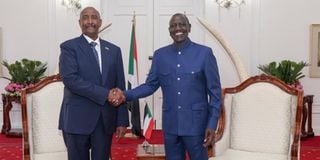Premium
President Ruto, al-Burhan back Jeddah peace process on Sudan

President William Ruto (right) and Sudan leader Abdel Fattah al-Burhan at State House, Nairobi, on November 13, 2023.
Kenya's President William Ruto and Sudanese leader Abdel Fattah al-Burhan agreed on Monday to support the Jeddah peace process for resolving the conflict in Sudan, in a move that significantly eased tensions that had built up between the two leaders and signalled support for peace.
The decision came at a meeting between the two in Nairobi, the details of which were only leaked by diplomatic sources in on Monday morning.
Burhan's trip to Nairobi followed a series of back channels between the two capitals, as well as a brief meeting between President Ruto and Burhan on the sidelines of the Saudi-African Summit in Riyadh last week.
While the Nairobi meeting means that Burhan has met all the Horn of Africa leaders involved in the conflict back home, it is his meeting with Ruto that could be significant: Burhan criticised Nairobi for allegedly siding with his opponent, Mohamed Hamdani Daglo Hemedti, the leader of the Rapid Support Forces who has been fighting the Sudanese army since April 15, leaving more than 9,500 dead.
In Nairobi, they " underscored the urgent need to find a solution to the conflict in Sudan in the shortest possible time".
"Recognising the slow progress in Jeddah, the leaders underscored the urgency to accelerate the process towards cessation of hostilities and humanitarian assistance".
They agreed to plan a summit for the regional bloc Intergovernmental Authority on Development (Igad) "to find ways to accelerate the Jeddah process towards a cessation of hostilities in Sudan".
The summit will also "agree on a framework for an all-inclusive Sudanese dialogue", according to a dispatch from State House.
The declaration could be a partial victory for both leaders. For Dr Ruto, it signals a buried hatchet with Burhan, who had publicly ridiculed President Ruto and threatened to quit Igad.
For Burhan, it signals his acceptance as the legitimate leader of Sudan, despite staying in power after a coup and in a stalled transition since the ouster of Omar al-Bashir.
Since the war erupted in Sudan on April 15, Burhan has toured all of Sudan's neighbours, visited Saudi Arabia, Qatar and Turkey, and addressed the UN General Assembly, where he promised to hand over power to civilian leaders once the war is over.
But he had to contend with those who view Hemedti as his equal. When the war began, various peace initiatives followed.
Igad had pursued its parallel peace bid which involved a quartet of Kenya, Ethiopia, South Sudan and Djibouti. But Khartoum rejected the quartet, especially after South Sudan was excluded from the initial mediation role.
Meanwhile, Saudi Arabia and the US began the Jeddah process, which also collapsed after several ceasefire agreements were violated within hours of being signed.
Igad and the African Union have since backed the Jeddah process, which showed signs of movement last week by agreeing to establish contacts between the warring parties as well as establish humanitarian corridors.
But fresh violence broke out hours later and the two sides couldn't agree on a ceasefire.





